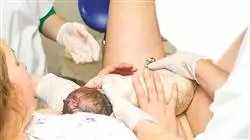University certificate
The world's largest faculty of nursing”
Introduction to the Program
Thanks to this program, you will learn cutting-edge techniques to handle potential emergencies affecting both the woman and the newborn during natural childbirth”

Natural childbirths have experienced notable popularization in recent years, driven by the emotions the mother experiences during the process and the minimization of risks for the pregnant woman. In this context, this type of delivery helps minimize the chances of hemorrhages or infections and avoid complications arising from anesthesia. This growth has, in turn, increased the demand for midwives who are familiar with the most up-to-date procedures in this field, in order to safeguard the well-being of both women and newborns.
In response to this demand, TECH has created this program, through which professionals will deepen their knowledge of the most advanced protocols for managing and caring for natural births. Over months of intensive learning, students will delve into the latest scientific and neuroscientific evidence regarding pregnancy and maternity, or explore cutting-edge techniques for handling water births and home deliveries. Additionally, students will discover sophisticated strategies for childbirth preparation and identify the structure of modern Natural Birth Units.
Since this program is delivered through a revolutionary 100% online modality, students can create their own study schedules, ensuring a completely efficient learning experience. Moreover, the program has been designed by excellent specialists in the field, all of whom have extensive experience in prestigious hospital centers. As such, all the knowledge shared will be fully applicable in daily practice.
Develop communication and empathy skills, strengthening the trust relationship with women and providing them with comprehensive support throughout their childbirth experience”
This Master's Degree in Natural Childbirth for Midwives contains the most complete and up-to-date university program on the market. Its most notable features are:
- The development of practical cases presented by experts in Natural Childbirth and Neonatology
- The graphic, schematic and eminently practical contents with which it is conceived gather scientific and practical information on those disciplines that are indispensable for professional practice
- Practical exercises where the self-assessment process can be carried out to improve learning
- Its special emphasis on innovative methodologies
- Theoretical lessons, questions to the expert, debate forums on controversial topics, and individual reflection assignments
- Content that is accessible from any fixed or portable device with an internet connection
The Relearning method featured in this program will allow you to update your knowledge at your own pace and without time constraints”
The program’s teaching staff includes professionals from the field who contribute their work experience to this educational program, as well as renowned specialists from leading societies and prestigious universities.
The multimedia content, developed with the latest educational technology, will provide the professional with situated and contextual learning, i.e., a simulated environment that will provide immersive education programmed to learn in real situations.
This program is designed around Problem-Based Learning, whereby the professional must try to solve the different professional practice situations that arise during the course. For this purpose, students will be assisted by an innovative interactive video system created by renowned experts.
Update yourself through a curriculum designed and developed by the best specialists in the field of Natural Childbirth"

Throughout this program, you will identify revolutionary techniques for Natural Childbirth Preparation"
Why study at TECH?
TECH is the world’s largest online university. With an impressive catalog of more than 14,000 university programs available in 11 languages, it is positioned as a leader in employability, with a 99% job placement rate. In addition, it relies on an enormous faculty of more than 6,000 professors of the highest international renown.

Study at the world's largest online university and guarantee your professional success. The future starts at TECH”
The world’s best online university according to FORBES
The prestigious Forbes magazine, specialized in business and finance, has highlighted TECH as “the world's best online university” This is what they have recently stated in an article in their digital edition in which they echo the success story of this institution, “thanks to the academic offer it provides, the selection of its teaching staff, and an innovative learning method aimed at educating the professionals of the future”
A revolutionary study method, a cutting-edge faculty and a practical focus: the key to TECH's success.
The most complete study plans on the university scene
TECH offers the most complete study plans on the university scene, with syllabuses that cover fundamental concepts and, at the same time, the main scientific advances in their specific scientific areas. In addition, these programs are continuously being updated to guarantee students the academic vanguard and the most in-demand professional skills. In this way, the university's qualifications provide its graduates with a significant advantage to propel their careers to success.
TECH offers the most comprehensive and intensive study plans on the current university scene.
A world-class teaching staff
TECH's teaching staff is made up of more than 6,000 professors with the highest international recognition. Professors, researchers and top executives of multinational companies, including Isaiah Covington, performance coach of the Boston Celtics; Magda Romanska, principal investigator at Harvard MetaLAB; Ignacio Wistumba, chairman of the department of translational molecular pathology at MD Anderson Cancer Center; and D.W. Pine, creative director of TIME magazine, among others.
Internationally renowned experts, specialized in different branches of Health, Technology, Communication and Business, form part of the TECH faculty.
A unique learning method
TECH is the first university to use Relearning in all its programs. It is the best online learning methodology, accredited with international teaching quality certifications, provided by prestigious educational agencies. In addition, this disruptive educational model is complemented with the “Case Method”, thereby setting up a unique online teaching strategy. Innovative teaching resources are also implemented, including detailed videos, infographics and interactive summaries.
TECH combines Relearning and the Case Method in all its university programs to guarantee excellent theoretical and practical learning, studying whenever and wherever you want.
The world's largest online university
TECH is the world’s largest online university. We are the largest educational institution, with the best and widest online educational catalog, one hundred percent online and covering the vast majority of areas of knowledge. We offer a large selection of our own degrees and accredited online undergraduate and postgraduate degrees. In total, more than 14,000 university degrees, in eleven different languages, make us the largest educational largest in the world.
TECH has the world's most extensive catalog of academic and official programs, available in more than 11 languages.
Google Premier Partner
The American technology giant has awarded TECH the Google Google Premier Partner badge. This award, which is only available to 3% of the world's companies, highlights the efficient, flexible and tailored experience that this university provides to students. The recognition as a Google Premier Partner not only accredits the maximum rigor, performance and investment in TECH's digital infrastructures, but also places this university as one of the world's leading technology companies.
Google has positioned TECH in the top 3% of the world's most important technology companies by awarding it its Google Premier Partner badge.
The official online university of the NBA
TECH is the official online university of the NBA. Thanks to our agreement with the biggest league in basketball, we offer our students exclusive university programs, as well as a wide variety of educational resources focused on the business of the league and other areas of the sports industry. Each program is made up of a uniquely designed syllabus and features exceptional guest hosts: professionals with a distinguished sports background who will offer their expertise on the most relevant topics.
TECH has been selected by the NBA, the world's top basketball league, as its official online university.
The top-rated university by its students
Students have positioned TECH as the world's top-rated university on the main review websites, with a highest rating of 4.9 out of 5, obtained from more than 1,000 reviews. These results consolidate TECH as the benchmark university institution at an international level, reflecting the excellence and positive impact of its educational model.” reflecting the excellence and positive impact of its educational model.”
TECH is the world’s top-rated university by its students.
Leaders in employability
TECH has managed to become the leading university in employability. 99% of its students obtain jobs in the academic field they have studied, within one year of completing any of the university's programs. A similar number achieve immediate career enhancement. All this thanks to a study methodology that bases its effectiveness on the acquisition of practical skills, which are absolutely necessary for professional development.
99% of TECH graduates find a job within a year of completing their studies.
Master's Degree in Natural Childbirth for Midwives
At TECH Global University, we are committed to the training and professional development of healthcare professionals. In this regard, we have created our Master's Degree in Natural Childbirth for Midwives to offer the opportunity to specialize in the area of respectful childbirth and birth. Natural childbirth is a technique that seeks to respect the woman’s timing and needs during the labor process. It is an option increasingly demanded and valued by mothers who seek to experience a unique and pleasurable moment when bringing their children into the world. To achieve this, it is essential to have professionals trained in the necessary techniques and practices to ensure a safe and complication-free delivery. Our Master's Degree in Natural Childbirth for Midwives is entirely online, allowing students to access classes from anywhere and at any time, adapting their studies to their schedules and needs. Additionally, students will have access to a team of expert professors in the field and a modern, effective teaching methodology that will allow them to acquire the necessary knowledge in a dynamic and engaging manner.
Specialize at the best School of Nursing
With our Master's Degree in Natural Childbirth for Midwives, students will expand their skills and knowledge in the care of natural childbirth, learn new techniques to support mothers and their families during pregnancy and childbirth, and develop abilities that will allow them to offer high-quality services aligned with current demands. In summary, if you are a midwife looking to specialize in natural childbirth, this postgraduate program from TECH Global University is the best option. Online classes, expert university professors, effective methodology, and the opportunity to acquire the skills and knowledge that will enable you to offer high-quality services tailored to the current needs of mothers and their families.







